高中英语语法 介词
- 格式:doc
- 大小:1.25 MB
- 文档页数:32
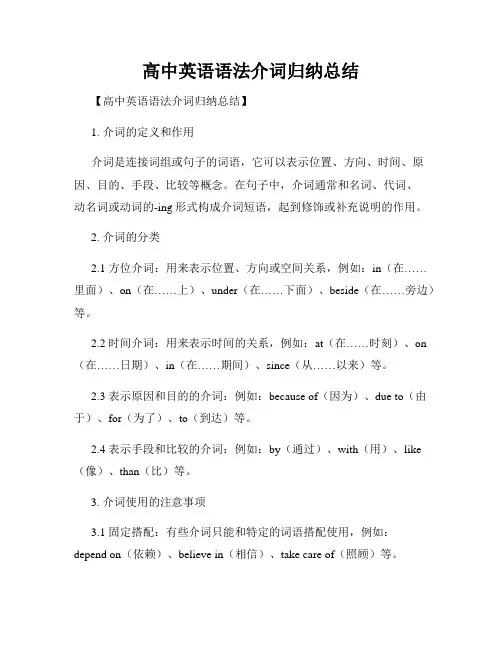
高中英语语法介词归纳总结【高中英语语法介词归纳总结】1. 介词的定义和作用介词是连接词组或句子的词语,它可以表示位置、方向、时间、原因、目的、手段、比较等概念。
在句子中,介词通常和名词、代词、动名词或动词的-ing形式构成介词短语,起到修饰或补充说明的作用。
2. 介词的分类2.1 方位介词:用来表示位置、方向或空间关系,例如:in(在……里面)、on(在……上)、under(在……下面)、beside(在……旁边)等。
2.2 时间介词:用来表示时间的关系,例如:at(在……时刻)、on (在……日期)、in(在……期间)、since(从……以来)等。
2.3 表示原因和目的的介词:例如:because of(因为)、due to(由于)、for(为了)、to(到达)等。
2.4 表示手段和比较的介词:例如:by(通过)、with(用)、like (像)、than(比)等。
3. 介词使用的注意事项3.1 固定搭配:有些介词只能和特定的词语搭配使用,例如:depend on(依赖)、believe in(相信)、take care of(照顾)等。
3.2 介词后的宾语:宾语通常是名词、代词或动名词,而且在形式上要与介词相匹配。
例如:for me(对我来说)、of them(他们的)、with singing(用唱歌的方式)。
3.3 介词短语位置:介词短语通常放在句子中适当的位置,以使句子结构更加清晰和流畅。
例如:The book on the table is mine.(桌子上的书是我的。
)4. 常用介词示例4.1 位置和方向介词:in(在……里面)、at(在……处)、on (在……上)、into(进入)、out of(离开)、off(离开)、up(上升)、down(下降)等。
4.2 时间介词:at(在……时刻)、on(在……日期)、in(在……期间)、since(从……以来)、before(在……之前)等。
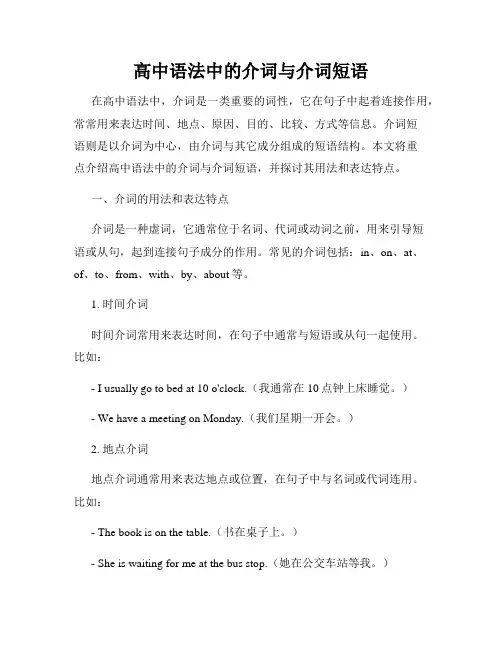
高中语法中的介词与介词短语在高中语法中,介词是一类重要的词性,它在句子中起着连接作用,常常用来表达时间、地点、原因、目的、比较、方式等信息。
介词短语则是以介词为中心,由介词与其它成分组成的短语结构。
本文将重点介绍高中语法中的介词与介词短语,并探讨其用法和表达特点。
一、介词的用法和表达特点介词是一种虚词,它通常位于名词、代词或动词之前,用来引导短语或从句,起到连接句子成分的作用。
常见的介词包括:in、on、at、of、to、from、with、by、about等。
1. 时间介词时间介词常用来表达时间,在句子中通常与短语或从句一起使用。
比如:- I usually go to bed at 10 o'clock.(我通常在10点钟上床睡觉。
)- We have a meeting on Monday.(我们星期一开会。
)2. 地点介词地点介词通常用来表达地点或位置,在句子中与名词或代词连用。
比如:- The book is on the table.(书在桌子上。
)- She is waiting for me at the bus stop.(她在公交车站等我。
)3. 原因介词原因介词常用来表示原因或理由,在句子中通常与短语或从句连用。
比如:- He is happy because of the good news.(他因为好消息而高兴。
)- I am tired from studying all day.(我因为整天学习而疲倦。
)4. 目的介词目的介词常用来表示目的或用途,在句子中通常与短语或从句连用。
比如:- I went to the supermarket to buy some food.(我去超市买点食物。
)- We practice speaking English for better communication.(我们练习说英语,为了更好地交流。
)5. 比较介词比较介词常用来表达比较关系,在句子中通常与短语或从句连用。
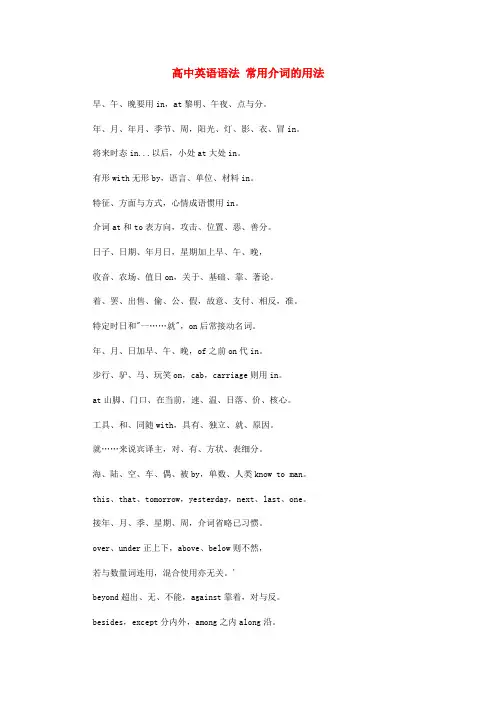
高中英语语法常用介词的用法早、午、晚要用in,at黎明、午夜、点与分。
年、月、年月、季节、周,阳光、灯、影、衣、冒in。
将来时态in...以后,小处at大处in。
有形with无形by,语言、单位、材料in。
特征、方面与方式,心情成语惯用in。
介词at和to表方向,攻击、位置、恶、善分。
日子、日期、年月日,星期加上早、午、晚,收音、农场、值日on,关于、基础、靠、著论。
着、罢、出售、偷、公、假,故意、支付、相反,准。
特定时日和"一……就",on后常接动名词。
年、月、日加早、午、晚,of之前on代in。
步行、驴、马、玩笑on,cab,carriage则用in。
at山脚、门口、在当前,速、温、日落、价、核心。
工具、和、同随with,具有、独立、就、原因。
就……来说宾译主,对、有、方状、表细分。
海、陆、空、车、偶、被by,单数、人类know to man。
this、that、tomorrow,yesterday,next、last、one。
接年、月、季、星期、周,介词省略已习惯。
over、under正上下,above、below则不然,若与数量词连用,混合使用亦无关。
'beyond超出、无、不能,against靠着,对与反。
besides,except分内外,among之内along沿。
同类比较except,加for异类记心间。
原状because of,、 owing to、 due to表语形容词under后接修、建中,of、from物、化分。
before、after表一点, ago、later表一段。
before能接完成时,ago过去极有限。
since以来during间,since时态多变换。
与之相比beside,除了last but one。
复不定for、找、价、原,对、给、段、去、为、作、赞。
快到、对、向towards,工、学、军、城、北、上、南。
but for否定用虚拟,复合介词待后言。
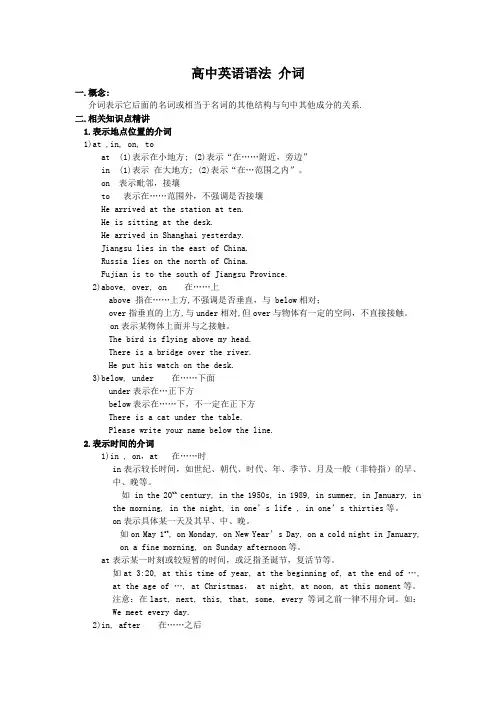
高中英语语法介词一.概念:介词表示它后面的名词或相当于名词的其他结构与句中其他成分的关系.二.相关知识点精讲1.表示地点位置的介词1)at ,in, on, toat (1)表示在小地方; (2)表示“在……附近,旁边”in (1)表示在大地方; (2)表示“在…范围之内”。
on 表示毗邻,接壤to 表示在……范围外,不强调是否接壤He arrived at the station at ten.He is sitting at the desk.He arrived in Shanghai yesterday.Jiangsu lies in the east of China.Russia lies on the north of China.Fujian is to the south of Jiangsu Province.2)above, over, on 在……上above 指在……上方,不强调是否垂直,与 below相对;over指垂直的上方,与under相对,但over与物体有一定的空间,不直接接触。
on表示某物体上面并与之接触。
The bird is flying above my head.There is a bridge over the river.He put his watch on the desk.3)below, under 在……下面under表示在…正下方below表示在……下,不一定在正下方There is a cat under the table.Please write your name below the line.2.表示时间的介词1)in , on,at 在……时in表示较长时间,如世纪、朝代、时代、年、季节、月及一般(非特指)的早、中、晚等。
如 in the 20th century, in the 1950s, in 1989, in summer, in January, in the morning, in the night, in one’s life , in one’s thirties等。
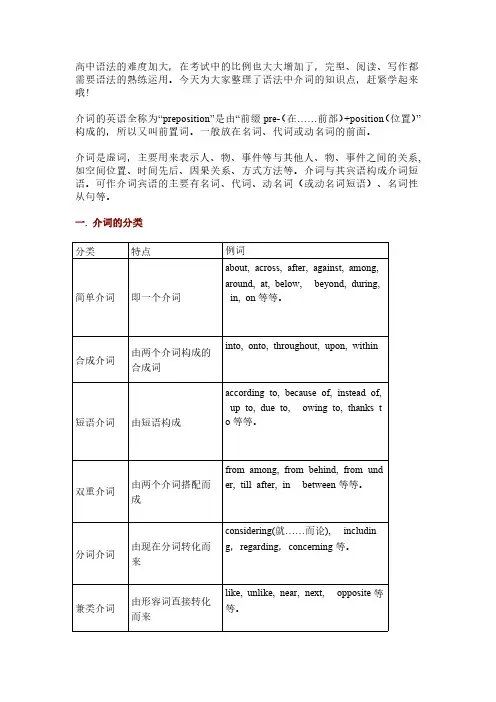
高中语法的难度加大,在考试中的比例也大大增加了,完型、阅读、写作都需要语法的熟练运用。
今天为大家整理了语法中介词的知识点,赶紧学起来哦!介词的英语全称为“preposition”是由“前缀pre-(在……前部)+position(位置)”构成的,所以又叫前置词。
一般放在名词、代词或动名词的前面。
介词是虚词,主要用来表示人、物、事件等与其他人、物、事件之间的关系,如空间位置、时间先后、因果关系、方式方法等。
介词与其宾语构成介词短语。
可作介词宾语的主要有名词、代词、动名词(或动名词短语)、名词性从句等。
一.介词的分类分类特点例词简单介词即一个介词about,across,after,against,among, around,at,below,beyond,during, in,on等等。
合成介词由两个介词构成的合成词into,onto,throughout,upon,within短语介词由短语构成according to,because of,instead of, up to,due to,owing to,thanks t o等等。
双重介词由两个介词搭配而成from among,from behind,from under,till after,in between等等。
分词介词由现在分词转化而来considering(就……而论),including,regarding,concerning等。
兼类介词由形容词直接转化而来like,unlike,near,next,opposite等等。
二.介词短语的语法功能介词不能独立在句中做成份,介词后必须与名词、代词、或动名词构成介词短语在句中充当一个成分,表示人、物、事件等与其它人、物、事件等之间的关系。
介词短语的功能例句作定语They didn’t find the solution to the problem.作状语We have breakfast at seven.(表时间)They were late for the meeting because of the heavy rai n.(表原因)What do you mean by doing such a thing?(表方法)Nothing in the world could live without air or water.(表条件)作表语When I paid a visit to you yesterday,you were not at h ome.作宾语补足语I found the old building in a bad condition.三.表示相同或相似概念的介词(短语)的区别表示的概念介词(短语)区别例子时间inonatat在一个时间点上;in在一段时间之内;on在具体某一天或具体的上午、下午、晚上。
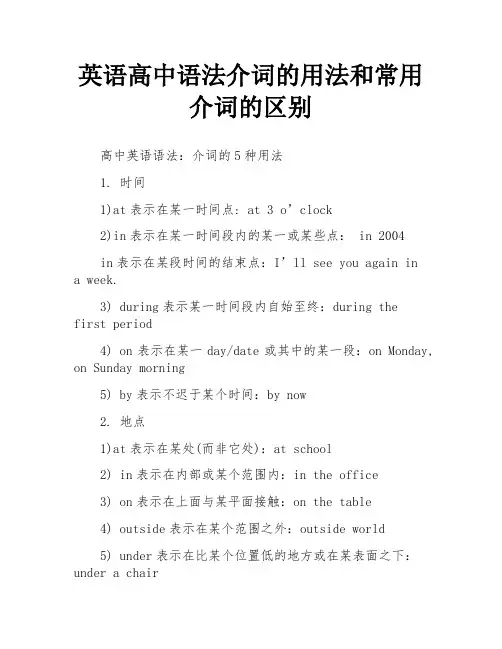
英语高中语法介词的用法和常用介词的区别高中英语语法:介词的5种用法1. 时间1)at表示在某一时间点: at 3 o’clock2)in表示在某一时间段内的某一或某些点: in 2004in表示在某段时间的结束点:I’ll see you again ina week.3) during表示某一时间段内自始至终:during thefirst period4) on表示在某一day/date或其中的某一段:on Monday, on Sunday morning5) by表示不迟于某个时间:by now2. 地点1)at表示在某处(而非它处):at school2) in表示在内部或某个范围内:in the office3) on表示在上面与某平面接触:on the table4) outside表示在某个范围之外:outside world5) under表示在比某个位置低的地方或在某表面之下:under a chair6) by表示靠近或接近:by the window3. 原因1)because of表示因为或以…为理由:because of my father2) for表示动作或活动的目的、目标或意图:for sale3) out of表示起源、来源或原因:out of duty4. 方式1)with表示以…方式:with skill2)in表示以某种方式: in French, in cash, in this way5. 方法1) by表示方法、手段: by the back road, by bus, by working hard2) on表示运送方式:on a train, on foot3) in表示途径或材料:in oils高中英语语法中常用介词的区别1、 at、in、on:如:常用词组有: at noon, at night表示时间的 at, in, on:at 表示片刻的时间,at 8 o’clock,at midnight, at the end of, at that time, at the beginning of, at the age of, at Christmas, at New Year 等。
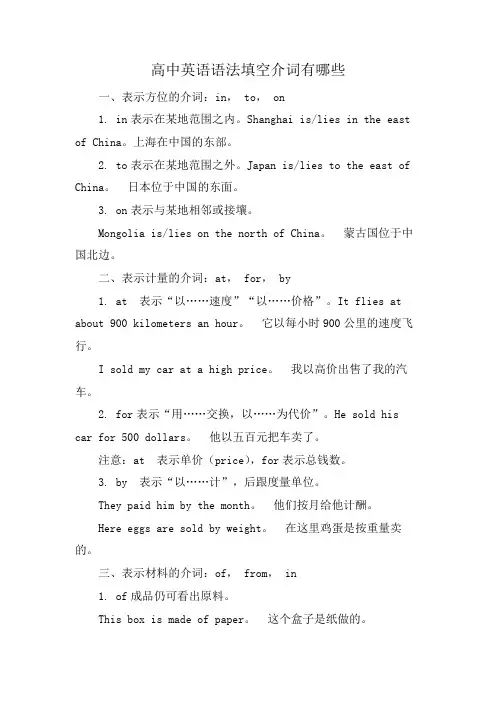
高中英语语法填空介词有哪些一、表示方位的介词:in, to, on1. in表示在某地范围之内。
Shanghai is/lies in the east of China。
上海在中国的东部。
2. to表示在某地范围之外。
Japan is/lies to the east of China。
日本位于中国的东面。
3. on表示与某地相邻或接壤。
Mongolia is/lies on the north of China。
蒙古国位于中国北边。
二、表示计量的介词:at, for, by1. at 表示“以……速度”“以……价格”。
It flies at about 900 kilometers an hour。
它以每小时900公里的速度飞行。
I sold my car at a high price。
我以高价出售了我的汽车。
2. for表示“用……交换,以……为代价”。
He sold his car for 500 dollars。
他以五百元把车卖了。
注意:at 表示单价(price),for表示总钱数。
3. by 表示“以……计”,后跟度量单位。
They paid him by the month。
他们按月给他计酬。
Here eggs are sold by weight。
在这里鸡蛋是按重量卖的。
三、表示材料的介词:of, from, in1. of成品仍可看出原料。
This box is made of paper。
这个盒子是纸做的。
2. from成品已看不出原料。
Wine is made from grapes。
葡萄酒是葡萄酿成的。
3. in表示用某种材料或语言。
Please fill in the form in pencil first。
请先用铅笔填写这个表格。
They talk in English。
他们用英语交谈。
四、表示工具或手段的介词:by, with, on1. by用某种方式,多用于交通。
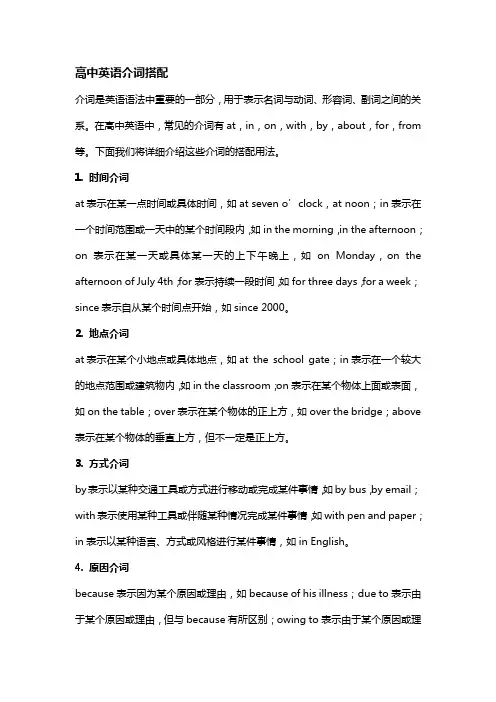
高中英语介词搭配介词是英语语法中重要的一部分,用于表示名词与动词、形容词、副词之间的关系。
在高中英语中,常见的介词有at,in,on,with,by,about,for,from 等。
下面我们将详细介绍这些介词的搭配用法。
1. 时间介词at表示在某一点时间或具体时间,如at seven o’clock,at noon;in表示在一个时间范围或一天中的某个时间段内,如in the morning,in the afternoon;on表示在某一天或具体某一天的上下午晚上,如on Monday,on the afternoon of July 4th;for表示持续一段时间,如for three days,for a week;since表示自从某个时间点开始,如since 2000。
2. 地点介词at表示在某个小地点或具体地点,如at the school gate;in表示在一个较大的地点范围或建筑物内,如in the classroom;on表示在某个物体上面或表面,如on the table;over表示在某个物体的正上方,如over the bridge;above 表示在某个物体的垂直上方,但不一定是正上方。
3. 方式介词by表示以某种交通工具或方式进行移动或完成某件事情,如by bus,by email;with表示使用某种工具或伴随某种情况完成某件事情,如with pen and paper;in表示以某种语言、方式或风格进行某件事情,如in English。
4. 原因介词because表示因为某个原因或理由,如because of his illness;due to表示由于某个原因或理由,但与because有所区别;owing to表示由于某个原因或理由,也与because有所区别;thanks to表示由于某个原因或理由而感激某人或某事。
5. 条件介词if表示在某个条件下实现某件事情,如if it rains;unless表示除非某个条件不成立或不满足,如unless you study hard;provided that表示在某个条件下实现某件事情,与if相似。
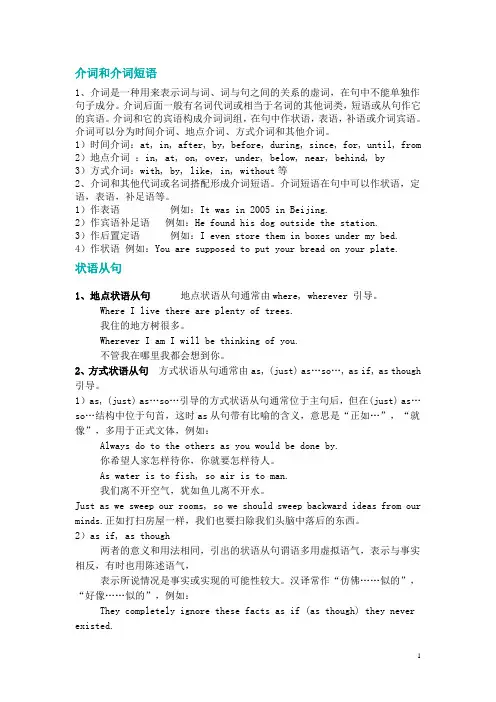
介词和介词短语1、介词是一种用来表示词与词、词与句之间的关系的虚词,在句中不能单独作句子成分。
介词后面一般有名词代词或相当于名词的其他词类,短语或从句作它的宾语。
介词和它的宾语构成介词词组,在句中作状语,表语,补语或介词宾语。
介词可以分为时间介词、地点介词、方式介词和其他介词。
1)时间介词:at, in, after, by, before, during, since, for, until, from 2)地点介词:in, at, on, over, under, below, near, behind, by3)方式介词:with, by, like, in, without等2、介词和其他代词或名词搭配形成介词短语。
介词短语在句中可以作状语,定语,表语,补足语等。
1)作表语例如:It was in 2005 in Beijing.2)作宾语补足语例如:He found his dog outside the station.3)作后置定语例如:I even store them in boxes under my bed. 4)作状语例如:You are supposed to put your bread on your plate.状语从句1、地点状语从句地点状语从句通常由where, wherever 引导。
Where I live there are plenty of trees.我住的地方树很多。
Wherever I am I will be thinking of you.不管我在哪里我都会想到你。
2、方式状语从句方式状语从句通常由as, (just) as…so…, as if, as though 引导。
1)as, (just) as…so…引导的方式状语从句通常位于主句后,但在(just) as…so…结构中位于句首,这时as从句带有比喻的含义,意思是“正如…”,“就像”,多用于正式文体,例如:Always do to the others as you would be done by.你希望人家怎样待你,你就要怎样待人。
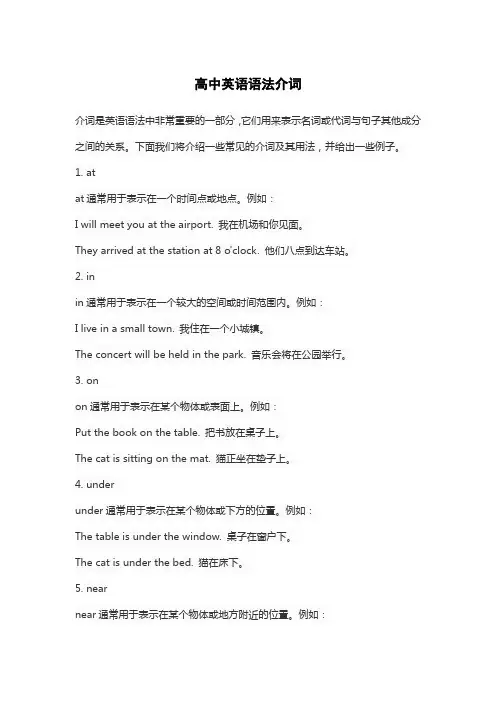
高中英语语法介词介词是英语语法中非常重要的一部分,它们用来表示名词或代词与句子其他成分之间的关系。
下面我们将介绍一些常见的介词及其用法,并给出一些例子。
1. atat通常用于表示在一个时间点或地点。
例如:I will meet you at the airport. 我在机场和你见面。
They arrived at the station at 8 o'clock. 他们八点到达车站。
2. inin通常用于表示在一个较大的空间或时间范围内。
例如:I live in a small town. 我住在一个小城镇。
The concert will be held in the park. 音乐会将在公园举行。
3. onon通常用于表示在某个物体或表面上。
例如:Put the book on the table. 把书放在桌子上。
The cat is sitting on the mat. 猫正坐在垫子上。
4. underunder通常用于表示在某个物体或下方的位置。
例如:The table is under the window. 桌子在窗户下。
The cat is under the bed. 猫在床下。
5. nearnear通常用于表示在某个物体或地方附近的位置。
例如:The school is near the railway station. 学校在火车站附近。
They sat near the fire. 他们坐在火堆旁边。
6. behindbehind通常用于表示在某个物体或人的后面位置。
例如:The car is behind the tree. 车在树后面。
The cat is behind the sofa. 猫在沙发后面。
7. beforebefore通常用于表示在某个物体或人的前面位置。
例如:The bus stop is before the bridge. 公交车站桥前面。
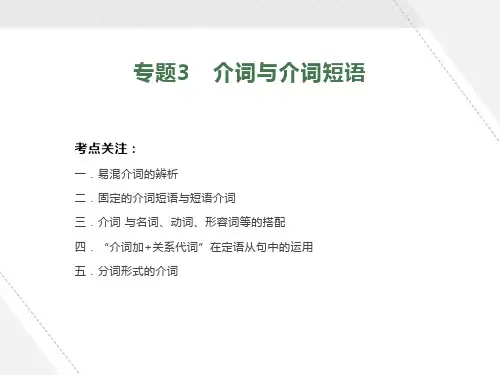
高中英语语法知识汇总:介词介词又叫前置词,是一种虚词。
介词在句子中不能单独使用,只能与名词、代词等构成介词短语,在句中作状语、后置定语、表语和补语等。
一、介词的分类二、表时间的介词:about, around, before, by, at, after, in, on, between, during, for, from, since, till, until, within等。
1.表示时间先后的before,after和in。
before表示某一时刻之前和after表示某一时刻之后。
in一般表示“从现在或说话时刻算起某一段时间之后”,用于将来时。
after则表示以过去为起点的某一段时间之后,用于过去时。
“in+时间段"也可作”在……之内"解。
He will be back in a few days. 他几天之后就回来。
He left on Monday and returned after three days. 他星期一走的,三天后回来的。
It's difficult to draw a horse well in half an hour.半小时之内画好一匹马是困难的。
2.表示"时间延续"的for, from...tofor表示动作或状态延续的时间长度,谓语动词必须是延续性的。
而from...to...表示“从……到……”。
We have studied English for three years. 我们学英语已三年了。
My family lived in Beijing from 1996 to 1999.我家从1996年到1999年住在北京。
3.表示"时限"的介词since, from, by, until(till)since表示动作的起始点,其意是 "从……以来 ",常与完成时态连用。
高考英语语法填空常考介词在高考英语语法填空中,介词是常考点之一,这些介词考点常常是考生们易错易混淆的地方。
下面就对每个介词考点进行详细的解释和扩充,帮助考生们更好地掌握这些介词的使用规则。
1. 表示时间的介词:at:常用于表示具体的时间点,如at 8 o'clock,at noon等。
on:用于表示在某一天或具体的某一天的上下午,如on Monday,on the afternoon of July 4th等。
in:用于表示在某个时间段内,如in the morning,in the afternoon等。
at the beginning of:在...的开始。
at the end of:在...的结尾。
in the middle of:在...的中间。
during:在...期间。
2. 表示地点的介词:at:用于表示在某个具体的地点或位置,如at the bus stop,at home等。
in:用于表示在某个建筑物、城市或较大的地理区域之内,如in the classroom,in Beijing等。
on:用于表示在某物的表面或与某物接触的表面,如on the table,on the ground等。
near:在...附近。
by:在...旁边。
between:在...之间。
in front of:在...的前面。
behind:在...的后面。
3. 表示方式的介词:by:用于表示通过某种方式或手段,如by bus,by phone等。
in:用于表示以某种状态或形式存在,如in English,in writing等。
on:用于表示在某种物体或表面上,如on the wall,on the table等。
4. 表示原因的介词:because of:由于...的原因。
due to:由于...的缘故。
这两个介词都可以用来表示原因,但略有区别。
because of更强调直接原因,而due to更强调因果关系。
高中英语语法整理总结归纳高中英语语法归纳总结介词I. 要点1、介词和种类(1) 简单介词,常用的有at, in, on, about, across, before, beside, for , to, without等。
(2) 复合介词,如by means of, along with, because of, in front of, instead of等。
2、介词和其他词类的习惯搭配关系(1) 和动词的搭配,如agree with, ask for, belong to, break away from, care about等。
(2) 和形容词的搭配,如afraid of, angry with, different from, good at(3) 和名词的搭配,如answer to , key to, reason for, cause of, visit to等.3、介词短语可以有自己的修饰语,这种修饰语通常有right, just, badly, all, well, directly, completely等少数几个副词。
如:He came right after dinner.He lives directly opposite the school.4、某些介词的意义与用法举例(1) at, on, in(表时间)表示时间点用at,如at four oclock, at midnight等;表示不确定的时间或短期假日也用at,如at that time, at Christmas等。
指某天用on, 如on Monday, on the end of November, 指某天的朝夕用on,如on Friday morning, on the afternoon of September 1st 等。
指长于或短于一天的时段用in,如in the afternoon, in February, in Summer, in 1999等。
高中英语语法归纳总结介词在高中英语学习中,介词(Preposition)是一个重要的语法知识点。
介词通常用于连接名词、代词、动词或其他词与句子其他成分,起到表示时间、地点、方向、原因、目的等各种关系的作用。
本文将对高中英语语法中常用的介词进行归纳总结,帮助同学们更好地掌握和运用介词。
一、介词的基本概念和分类1. 介词的定义:介词是一类虚词,常由一个或多个字母构成,放在名词、代词或动词等前面,用以表示各种关系,如时间、地点、原因、目的等。
2. 介词的分类:- 时间介词:at, on, in, during, for等。
- 地点介词:in, on, at, by, under等。
- 方向介词:to, from, into, out of, up等。
- 方式介词:with, by, in, without等。
- 原因介词:because of, due to, thanks to等。
- 目的介词:for, to, in order to, so as to等。
二、常用介词用法总结1. 时间介词:- at:用于表示具体的点、时刻或某一天的准确时间,如at 7 o'clock, at noon, at Christmas等。
- in:用于表示较长的时间段、月份、季节、年份等,如in the morning, in May, in winter, in 2022等。
- on:用于表示某一天、日期或具体的星期几,如on Monday, on January 1st, on the weekend等。
- during:用于表示整个时间段或某一时期,如during the summer, during the meeting等。
- for:表示持续的时间段,如for two hours, for a week等。
2. 地点介词:- in:用于表示较大的范围、国家、城市、地区等,如in China, in Beijing, in the classroom等。
英语中的介词有:in、on、about、with、at、beside、by、near、behind、across。
in意思:prep.在…里;在…中;在…期间;在…以后;adv.进;入;在里头;到达;上涨;adj.在家的;在办公室的;流行的;symbol(In)铟;abbr.(IN)印第安纳州。
例句Pilot whales can go to 600 metres in a dive lasting 18 minutes.领航鲸一次下潜可达600米,持续18分钟。
He had to keep his large family in the manner he had chosen.他不得不以他所选择的方式养活他的一大家子人。
on意思:prep.在…上;位于;关于;涉及;作为成员;以…为目标;adv.在上面;继续着;上演;进行中;开着的;n.【板球】腿侧区;(ON)安大略;古挪威语。
例句I did not get where I am today by sitting on my duff.我可不是靠整天坐着不动取得今天这样的成就。
That reminds me to bring you up to speed on the soap opera.那提醒我要让你跟上那剧情。
about意思:prep.关于;有关;在…各处;围绕着;在…中各处;对于;为了;adv.各处;到处;在里面各处;四下;大概;大约。
例句You can live how you like, but there's the children to think about.你可以爱怎么过日子就怎么过,但要考虑孩子。
He had heard gossip that I was gadding about with an airline stewardess. 他曾听到关于我的闲话,说我和一位空姐四处寻欢作乐。
with意思:prep.和…在一起;跟;同;和;有;带有;用;以;借助;反对;对立;由…负责;由…处理;对;对于;为…所雇用;作为…的成员;受…影响;表示与某物分离。
高中英语语法知识词法部分讲解---------介词及练习一.概念:介词(preposition)又叫做前置词,一般置于名词之前。
它是一种虚词,一般不重读, 在句中不单独作任何句子成分,只表示其后面的名词或相当于名词的其他结构与句中其他成分的关系。
介词后面的名词或相当于名词的词语叫做介词宾语。
可作介词宾语的词语通常有:1) 名词或名词性从句:eg. ①He lives near our school. ②This will give me some idea of what life is.2) 代词: eg. ① I am angry with him. ② She isn’t satisfied with me.3)动名词或动名词短语: eg. I have an idea fro solving this problem.4)不定式(只限于介词but和except):eg.①I can do nothing for them but just sit her there and hope.②I can do nothing for them except to send them money.5)数词:eg. Four from seven leaves three.6)形容词:eg. I know it from old. 我早就知道它。
7)副词:eg. I can’t stay for long.注意:英语介词往往相当于汉语的动词。
eg.① The policeman helped the old woman across the street. 警察帮助老大娘过马路。
(“过”=across)②Are you for it or against it? 你赞成还是反对?(“赞成”= for; “反对”= against)二、介词的种类:A.介词按其构成分为1) 简单介词(simple preposition):eg.at; in; of since, before, after等。
2) 复合介词(compound preposition): eg.as for; as to; into; out of 等。
3) 二重介词(double preposition) eg.from under; from behind; until after; except in等。
4) 短语介词(phrasal preposition) eg.according to; because of; in spite of; on behalf of等。
5) 分词介词( participle preposition) eg.regarding; concerning; including; providing等。
B.介词按其词义分为1)地点介词:eg.across; among; around; above; after; along; at; before; behind; below等。
2)时间介词: eg.about; after; sround; as at; before; behind; between; by; during; for, from..3)比较介词: eg.as; like; over; above等。
4)除外介词: eg.besides; but; except等。
5)反对介词: eg.against; with等。
6)原因介词: eg. for; with; from等。
7)结果介词: eg.for; with; without等。
8)方式介词: eg.by; in; with等。
9)所属介词: eg.of; with等。
10)条件介词: eg. on; without; considering等。
11)让步介词: eg.in spite of; despite等。
12)目的介词: eg.for; to等。
13)根据介词: eg. on; according to等。
三、介词短语及其功用:介词和介词宾语一起构成介词短语(Prepositional phrase), 介词短语在句中可用作:1)主语:eg.From Beijing to Tianjing is two hours by train. 2)表语:eg.She looks like an actress.3)宾语:eg.I’ll give you until tomorrow.4)定语:eg. A friend in need is a friend indeed.5)补语:eg.They found themselves in a dark wood.6)状语:eg. Albert has so much work to do so that he is staying late at the office.四、相关知识点精讲:1.表示地点位置介词:1.1)at ,in, on, to:at : (1)表示在小地方; (2)表示"在……附近,旁边";eg. ①He arrived at the station at ten. ②He is sitting at the desk.(3)表示的位置是某一点;eg. at the third crossroad/ at 108 Beijing Street/ at the North Pole(4)可接集体活动。
eg.at a party/concert/lecture/meeting…at home/ at the corner of the street/at the front of the hallin : (1)表示在大地方; (2)表示"在…范围之内";(3)表示的位置往往是立体的,有长、宽、高等。
eg. ①He arrived in Shanghai yesterday. ②Jiangsu lies in the east of China.③in the desk/in the corner of the room/in a picture/in the wallon: (1) 表示毗邻,接壤; (2)表示的位置往往是一个平面或一条线。
eg. Russia lies on the north of China./a city on the river/a hotel on the this roadto 表示在……范围外,不强调是否接壤. eg. Fujian is to the south of Jiangsu Province.2)above, over, on: 在……上above: (1) 指在……上方,不强调是否垂直,与below相eg. ①The bird is flying above my head.对;两物体中间有一定的空间距离。
②There are lights above/over our heads.(2) 与刻度连用时,用above。
③Can you see the plane flying over/above the building?eg. three degrees above zero. ④The water came above/over our knees.over: (1)指垂直的上方,与under相对,但over与物体eg. ①There is a bridge over the river.有一定的空间,不直接接触. eg.①There’s a thick cloud over the north of China.(2)表示“布满”,“盖满”②There is a table cloth over the table.(3)表示“穿越”, “越过”,用over或acorss。
eg.He walked over/across the bridge./There is a bridge over/across the river.(4)与数字连用时用over=more than。
eg.over 100 people/over 800 metres above sea levelon: 表示某物体上面并与之接触. eg. He put his watch on the desk./ on the wall3) below, under: 在……下面under: (1)表示在…正下方,有垂直之意。
eg. There is a cat under the table.(2)接普通数词,under =less than eg.100 metres below sea level / children under seven years of age / under fifty below:(1)表示在……下,不一定在正下方eg. Please write your name below the line.(2) 与刻度连用时,用below。
eg. ten degrees below zero小测试:1. Mary’s________the garden. A.in B.at C.on D.into2. Don’t worry. She’ll finish the work in______twenty minutes. A. below B.on C.above D.over3.From the bridge we could see the river__________. A. below us B.below ourselves C.under us D.under ourselves4.The weather here is 20 degrees___________zero today. A.under B. in C.below D.on5.He will be back__________20 minutes. A.after below B.in below C.after under D.inunder6.When they looked up, they saw a plane________the tall building. A. on B.over C.through D.in7.He finished his work in_________twenty minutes. A.above B.below C.over D.across8.He lives____________203 Huanghe Street. A. on B.in C.at D.to2.表示时间介词:1) in , on,at: 在……时in: 表示较长时间,如世纪,朝代,时代,年,季节,月及一般(非特指)的早,中,晚等。